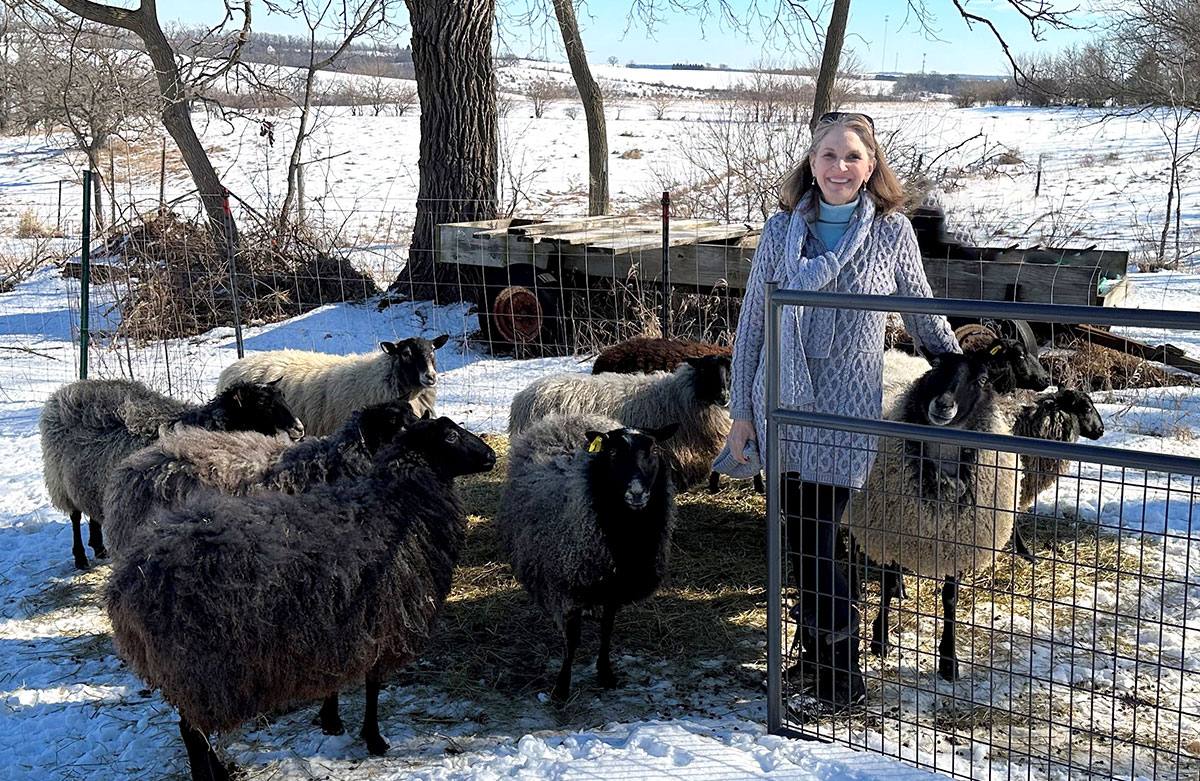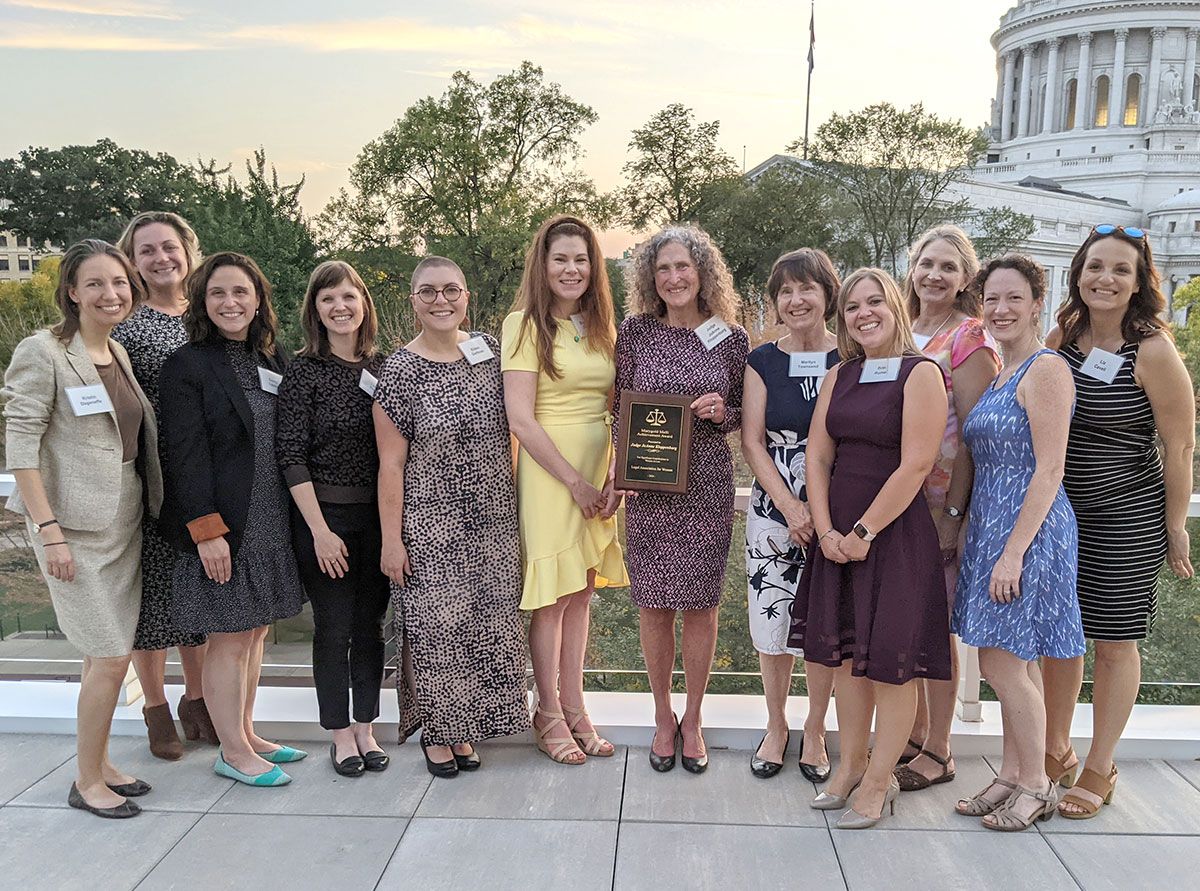
Tracey Schwalbe with some of the Gotland sheep she raises on her family's 15-acre farmstead near New Glarus. “I am next to my good buddy, Stevia, who likes to be in most photos,” she says. Their flock has 12 sheep this year.
March 15, 2023 – Tracey Schwalbe’s career path has led her to make a huge impact on Indigenous people in Wisconsin and those involved in unemployment insurance issues.
Schwalbe is with the Wisconsin
Labor & Industry Review Commission, practicing in employment and administrative law. She is currently president of the
Legal Association for Women (LAW).
What led you to becoming a lawyer?
I was led to the law after reading several books about legal issues affecting Indigenous communities in the 1980s, and I decided that Indian law was an area where I could make a positive difference.
Fast Facts
Name: Tracey Schwalbe
JD: UW Law School, 1988
Position: Labor & Industry Review Commission
There were no lawyers in my family, so it was difficult for me to figure out the process to apply for law school, and then to navigate the unfamiliar culture of law school.
By contrast, my husband, Dan Gartzke, is a lawyer who had several lawyers in his family, including his father (a court of appeals judge), his sister, and some cousins.
He grew up talking about law at the dinner table, and knew for a long time that he wanted to be a lawyer. I think he had quite a head start understanding how law school worked and the application of basic legal concepts.
Interestingly, my three children grew up with two lawyers as parents and hearing us talk about the law, but none of them has chosen to go into the legal field (yet). They are a science teacher, a software engineer, and an accountant.
You earned your J.D. from U.W. Law School in 1988. As a young lawyer, what were some of the challenges that you faced in terms of your development as a lawyer, personally and professionally?
One of the challenges I faced in my development as a lawyer was balancing work and family life. When I started a family, I had twins when my oldest child was not quite two years old, so I had three babies in diapers for a while. It was sometimes difficult adjusting to two different worlds: one of nurturing caregiving and one of the more rigid legal world.
I was fortunate that my husband was also able to provide caregiving to the children, and I was fortunate to find good childcare. However, most of the caregiving still fell to me, and I found it a challenge to balance family needs, law firm needs, client needs, etc. I know I did not sleep much during those early years, but I did try to maintain my professional demeanor while practicing law.
At the time, there really were no mentors I could look to for advice on how to manage legal work and family life. I was not in the first wave of women entering law school in the 1970s, but the few women before me were still new to the practice of law, and it seemed like they were still trying to figure it out, too.
Actually, at times, I was the only woman practicing law in the county where I lived, so there were not even any other women to talk to about these issues.

In this photo from 2021, members of the LAW board gathered to present their 2021
Marygold Melli Achievement Award to Court of Appeals Judge JoAnne Kloppenberg. From the left: Kristin Degeneffe, Lizzy McInerny, Corey Lorenz, Leslie Freehill, Eileen Dorfman, Breanne Snapp, Judge Kloppenberg, Marilyn Townsend, Erin Rome, Tracey Schwalbe, Olivia Mote, and Liz Cavell. Not pictured were Maddy Ziegler, Lynn Lodahl, and Vanessa Kuettel. The organization is seeking nominations for the 2023 recipient – nomination deadline is April 28, 2023. The award honors an individual in Wisconsin who has made substantial contributions to the interests of women in law.
Tell us about your career path.
I have certainly taken roads less traveled in my long career. As I indicated, I came to the law out of an interest in working with Indigenous communities.
I originally planned to work on the Navajo/Diné reservation. I toured their offices around the reservation, and my hope was to work in Tuba City, Arizona. However, due to budget cuts at this time, the positions became unavailable.
Instead, I found work closer to home in Wisconsin, and took a position as the in-house tribal attorney for the Lac Courte Oreilles Band of Lake Superior Chippewa Indians (LCO) near Hayward. Though a much colder location, this was a great opportunity to work on exactly the kinds of issues that I had wanted to work on and that were of great significance to the people of LCO.
I represented LCO on the Chippewa Indian Treaty Rights case and got extensive federal litigation experience. I took primary responsibility for the wild rice harvest issues for the six tribes, drafted numerous laws for the tribe, helped to strengthen the tribal courts, prosecuted conservation cases, handled Indian Child Welfare Act cases, worked on gaming issues, and worked on land issues and helped to restore a pipestone quarry to the LCO reservation.
I also worked on issues for several of the LCO businesses and agencies, including the hydroelectric dam, forestry, housing, construction, the radio station WOJB, and the LCO schools.
It was very difficult but rewarding work, and I learned a great deal about the strength and resilience of the LCO people and how important it was for them to have lawyers to speak up for them in order to maintain their sovereignty, especially given the conflicting jurisdictional issues.
About the Legal Association for Women
-
Mission: Advancing the interests of women in the legal profession and system, promoting equality and justice for all, and improving relations between the public and the legal system.
-
Current president: Tracey Schwalbe
-
Number of members: 100 +
-
When organized: 1974
-
Annual dues: $50
-
Learn more: Visit
lawdane.com.
What are you most proud of so far in your career?
When I married and moved back to the Madison area, I worked for a small private law firm doing a variety of legal work while my children were young.
I also continued to do some work for the LCO people, handle cases in several tribal courts, and also served as counsel for a Ho-Chunk business. I also served as president of the State Bar of Wisconsin Indian Law Section.
During this time, I was honored to litigate a federal secretarial election and voting rights lawsuit on behalf of the LCO people against the U.S. Bureau of Indian Affairs. After winning at the Seventh Circuit and filing the brief opposing certiorari with the Supreme Court, and after winning on remand, I was able to help restore the voting rights of hundreds, if not thousands, of LCO people to vote on issues affecting their own constitution. The lawsuit also resulted in the tribal constitutional change that allowed thousands of children of tribal members to become tribal members, strengthening the tribe for future generations.
The lead plaintiff in the case, Sandy Thomas, had tremendous integrity, fortitude, and focus on doing the best for her tribe. The case was very challenging, but it was one of the most rewarding cases of my career.
What other work have you done in your career?
After practicing law and managing my own law firm business with my husband for a time, I was interested in a change.
I was intrigued by a position as "research attorney" for the unemployment insurance (UI) program, and when I got the position, I was delighted to find out that my job was to become
the expert in Wisconsin on the UI program.
I dove into the challenge and learned everything I could about the UI program. I spent several years drafting UI laws and working with the state's UI Advisory Council, as well as "writing the book" on UI for the State Bar.
I was again thrilled to be able to make a difference in the lives of so many people during the Great Recession of 2008. I brought my UI skills, as well as my management and litigation skills, to my next position with the Labor & Industry Review Commission (LIRC).
What are you most proud of in your work at LIRC?
I am very proud that I was able to streamline and improve the processes at LIRC, improve the quality and accountability of commission decisions, manage several IT project improvements for the commission, and become a certified public manager.
During this time, I coordinated a coalition of stakeholders to educate legislators about LIRC's role when there were efforts to eliminate LIRC in the state budget process. Saving LIRC was something I felt compelled to do, because I believe in the agency's mission and the value that LIRC provides to the people of Wisconsin. Though some of the improvements and advances have been lost since the attacks on LIRC, I am enormously proud and gratified that because of my efforts, the commission still exists today to carry out its work for the people of Wisconsin.
What are some lessons you’ve learned along the way?
From the variety of legal experiences that I have had over the years, I have learned that it is important to stay strong and be brave in the face of bullying and harassment. Not everyone can do that, and there are people who will even enable it actively or with their passivity.
But perseverance is important, and it is important to keep your moral center, stand up to injustice, work hard to fight bad decision-making, and know that one determined person can make a tremendous difference in the lives of many people.
What should we know about LAW?
LAW is a group of dynamic people interested in supporting women in the legal profession and promoting equality and justice for all. I have served on the board for several years.
For four years, I was a programming co-chair for the CLE luncheons. This was a great opportunity to meet others in the legal community and to provide high-quality CLE programs. I still appreciate the monthly CLE luncheons, and it is always a great opportunity to network with lawyers in other practice areas.
LAW has also provided an opportunity to mentor younger attorneys informally, something I would have appreciated when I was a new lawyer and that I am glad to be able to provide now.
When you have free time, what do you like doing?
During my free time, I enjoy being a shepherd for my small flock of pampered Gotland sheep.
I enjoy fiber arts and working with wool and natural dyes, as well as attending fiber-related workshops, such as at the
Sheep & Wool Festival.
I also enjoy reading, gardening, beekeeping, making maple syrup, planting trees, burning prairies, and playing the hammered dulcimer.
I try to eat healthy foods and don’t really eat sugar or flour/processed foods anymore. We garden and sustainably raise our own grass-fed lamb. I usually cook all of our food for the week in a couple of hours on the weekend.
Associations Supporting Wisconsin Women Lawyers
Three associations in Wisconsin support women lawyers:
